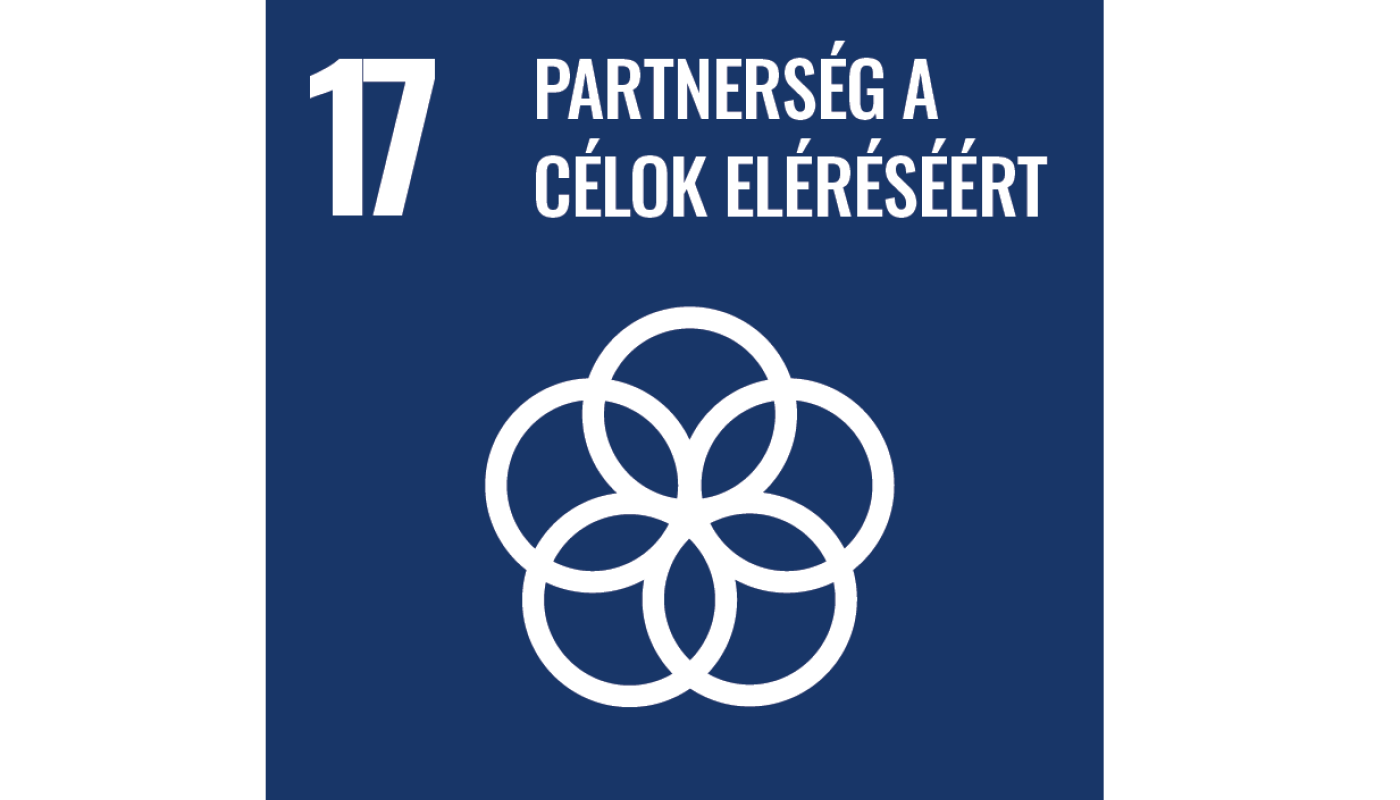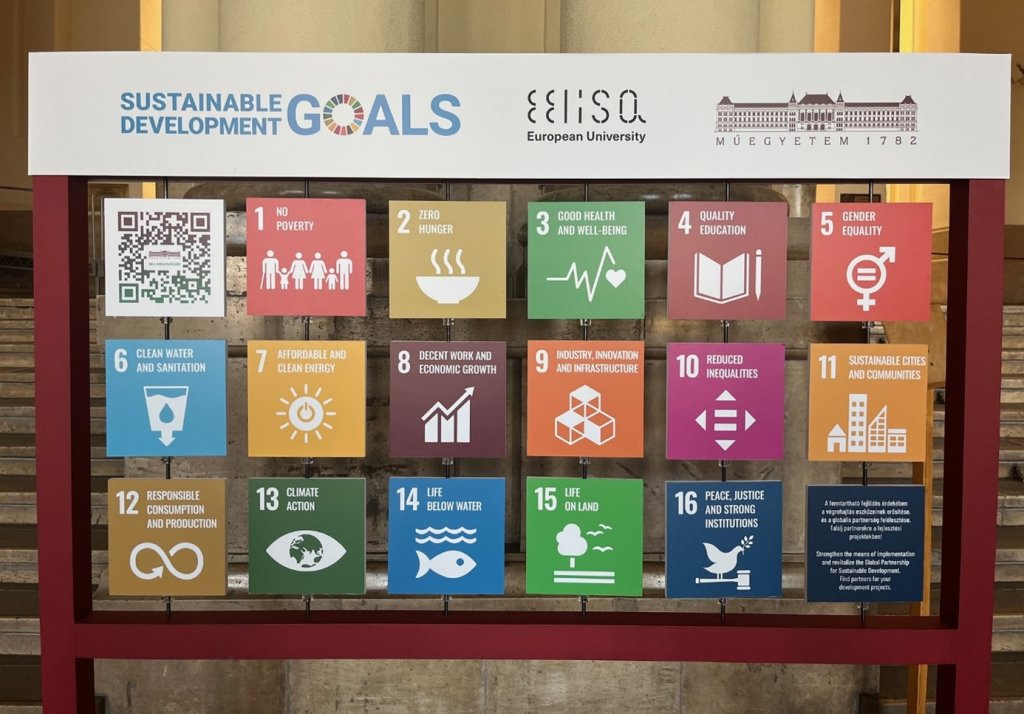News feed
17 goals for a better world – no. 17: Partnerships for a Better World
2024. 07. 02.
Our series of articles entitled “Sustainable Tuesday(s)”, will take a look over 17 weeks at the 17 Sustainable Development Goals (SDGs) set by the UN to make the world a better place.
This time, we will explore in more detail goal no. 17: Partnerships for a Better World, which is to: strengthen the means of implementation and revitalize the Global Partnership for Sustainable Development. Let’s engage partners in development projects!

The sustainability goal related to global partnerships (SDG17) is reflected in the research and educational objectives of the Budapest University of Technology and Economics (BME). Participation in international and European consortia is just as important as organising education within a community and relational framework. BME alumni maintain their connections with the University, and BME also strives to offer opportunities for international networking to both students and researchers.
BME fosters diverse partnerships in education, research, innovation, and industrial relations. Each faculty and department has extensive networks in their respective fields, and numerous collaborative agreements are made daily at the university level, ranging from autonomous vehicles, satellites, artificial intelligence, sustainability, healthcare technologies, digitisation projects, inland navigation, to professional assistance in disaster situations. The following is a non-exhaustive list of partnerships that are intrinsically linked to sustainability.
In the autumn of 2022, the University of Pécs established the "Sustainability Platform of Hungarian Universities," with BME as a founding member. One year after its establishment, BME organized a large-scale conference titled "Outcomes and experiences in universities becoming sustainable" which saw representation from 11 of the 14 member universities. Nine of these universities delivered presentations, and in the afternoon, BME showcased seven demonstrations of its ongoing sustainability projects.
The Budapest University of Technology and Economics is fully eligible to participate in the programme Horizon Europe. Involvement in consortia is supported by BME’s Competence map, launched in May 2022, which offers abundant information about the competence and results of the BME researchers and research groups, with a focus on helping to find research partners for European project proposals.
BME is also a participant of the EELISA (European Engineering Learning Innovation and Science Alliance) programme, which connects it to nine other leading universities in Europe. The EELISA programme aims to transform higher education in Europe by promoting cooperation between universities, fostering interdisciplinary education, and increasing the mobility of students and faculty members across Europe. The Budapest University of Technology and Economics (BME) is an active member of the association with its full portfolio including engineering and business disciplines. Through the EELISA programme, students can benefit from partial transfers to top technical universities in Europe – as well as work opportunities at diverse EELISA communities – without having to go abroad for the entire duration of their studies.
In January 2023, staff and students from BME’s Faculty of Civil Engineering and the Faculty of Mechanical Engineering participated in a workshop organized by the Technical University of Madrid (UPM). The event brought together 150 students from 13 European universities as part of the EELISA Community ”Sustainable Buildings, Cities, and Communities”. The workshop focused on developing a comprehensive sustainable refurbishment concept for a building of the European Space Agency. Throughout the week, students and faculty members exchanged innovative ideas related to the three pillars of sustainability, and digitalization.
The Department of Electronics Technology at BME’s Faculty of Electrical Engineering and Informatics (VIK) is currently engaged in its third Erasmus+ project on "skill-alliance." These "Cooperation for Innovation and the Exchange of Good Practices" initiatives bring innovation and best practices to the forefront through the collaborative efforts of consortium members in microelectronics education and industrial-academic training. Building on the success of the MECA and METIS projects, the European Chips Skills Academy (ECSA Project No. 101110124) aims to address the skills gap in the microelectronics sector through a partnership approach.
In a previous article, we reported on Kristóf Hegedűs, a doctoral student at the Faculty of Electrical Engineering and Informatics at BME, who, along with his colleague, envisioned a platform connecting eco-conscious users with sustainability-minded companies for a greener future. Their creation, Beeco, is a modern solution designed to reduce eco-stress. The app, available on both Android and iOS, features a map marking responsible business locations striving for sustainability. This platform showcases the power of the sustainability community at both local (city) and national (country) levels.
The BEAMING project (2024-2027), a Horizon WIDERA initiative aimed at increasing competitiveness in the biomass-based economy, is being led by the Laboratory of Plastics and Rubber Technology at the Faculty of Chemical Technology and Biotechnology. This project seeks to strengthen the connections between universities in Central, Eastern, and South-Eastern Europe, as well as the Western Balkans, through knowledge transfer and research capacity building. Furthermore, researchers at the Faculty of Chemical Technology and Biotechnology (VBK) are playing a significant role in the BOOST4BIOEAST project (2024-2026), another Horizon initiative focused on establishing national expert committees on the biomass-based economy and developing national "bioeconomy" action plans. To facilitate collaboration with these expert groups, BME has also established a bioeconomy working group.
Another significant research collaboration recently launched by the Department of Physical Chemistry and Materials Science at the Faculty of Chemical Technology and Biotechnology is the CLEANWATER (2024-2027) MSCA "Staff Exchange" project. This initiative aims to develop multifunctional and safe adsorbers for removing contaminants from drinking water.
Statistics from recent years across the faculties highlight BME's dedication to partnership objectives, with 4 publications, 6 research projects, 15 student projects, and 1 subject.
| The term SDG stands for the 17 Sustainable Development Goals established by world leaders at the 2015 UN summit to set new directions for global development. In a series of articles called “Sustainable Tuesday(s”, we will take a look at the 17 Sustainable Development Goals (SDGs) over 17 weeks and show what BME is doing to achieve them, within its own means. You can check out these development goals in a playful way with the help of boards placed at the entrances of the 3 busiest buildings (E, K, Q) on the BME campus. For more information on this topic, you can join the BME GreenHub Facebook group and visit BME’s main website to access our BME for Sustainability platform |
GA, KK (BME Committee on Sustainability)
